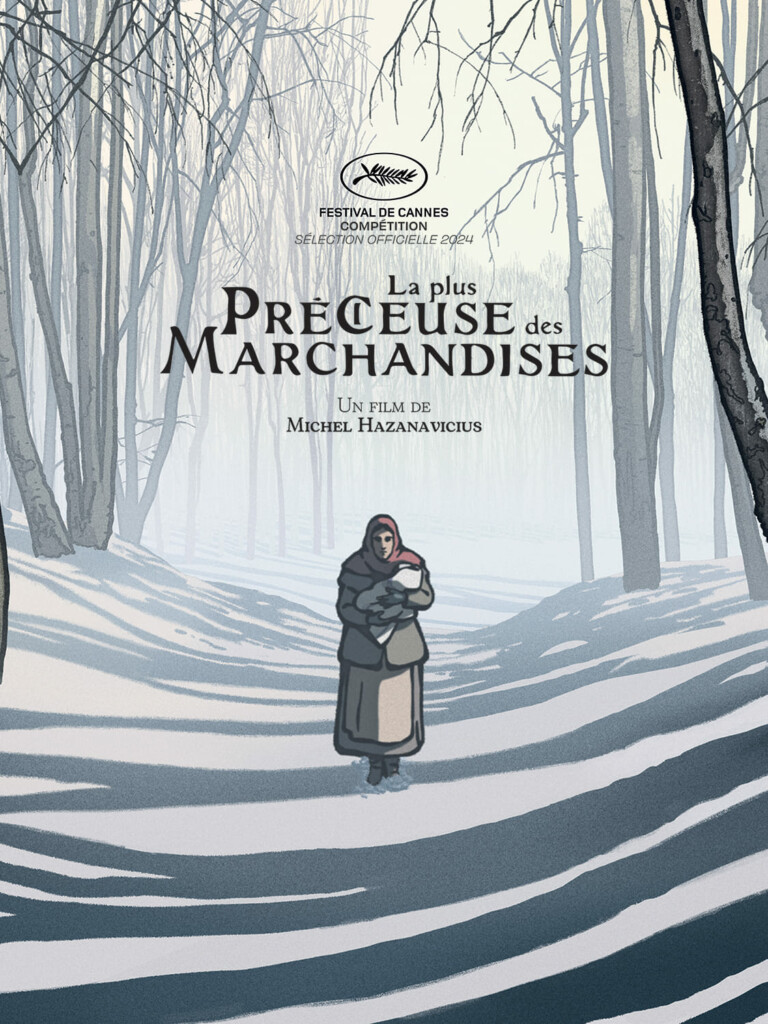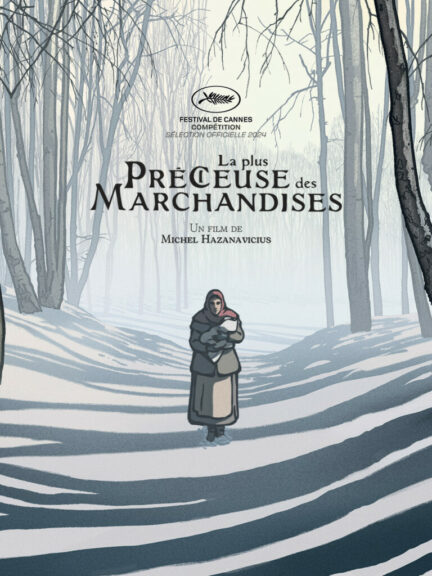
A film by Michel Hazanavicius
With: Jean-Louis Trintignant, Dominique Blanc, Denis Podalydès, Grégory Gadebois
Once upon a time, a poor woodcutter and his wife lived in a great forest. Cold, hunger, poverty and a war raging all around them meant their lives were very hard. One day, the woodcutter’s wife rescues a baby. A baby girl thrown from one of the many trains that constantly pass through the forest. This baby, this « most precious of cargoes », will transform the lives of the poor woodcutter’s wife and her husband, as well as those whose paths the child will cross – including the man who threw her from the train. And some will try to protect her, whatever the cost. Their story will reveal the worst and the best in the hearts of men.
Our rate: **
Michel Hazanavicius‘s The most precious of cargoes opens with a strange title that, with the notion of “cargoes”, refers to the industrial dimension of a society capable of designing the tools of mass destruction inflicted by the Final Solution on the Jewish people, of which Nazism is in a way the morbid grimace; and that, on the other hand, refers to the idea of the election of this Jewish child, itself referring to the more general idea of the Chosen People. The title, like the subject, can therefore be read in the context of a political conflict that is stirring public opinion, as a pro-Israeli work and a message of support or rehabilitation, even though its production probably anticipated the conflict.
The film tells the story of a child abandoned on the outskirts of the Auschwitz camp, who is hardly ever seen. He is taken in by a “poor woodcutter” who fights with extraordinary energy, first with her husband, then with the woodcutting community, to keep this child, whom she loves more than anything, even to the point of sacrifice. This blessed child is also a cursed child, causing the death of the woodcutter, a soldier who takes them in, and the woodcutters who want to denounce the child. The exemplary behavior of the woodcutter, who is unknowingly a member of the Resistance, towards the infant, serves as a didactic metaphor for a duty to be valiant, and for what it is to have a heart… A simple heart, as Gustave Flaubert would say, who immortalized the female character of Félicité, a country girl whose simple faith and unconditional love for others leads her to Grace.
That’s what The most precious of cargoes is all about: returning to the childlike simplicity of a tale, easy to understand, easy to watch, pleasant, touching, chilling and warm at the same time, with the gravity of its subject and its Polish winter landscapes and the fire burning in the hearth of the cabin and the heart of the woodcutter. Targeting a family audience, this animated film seeks to rehabilitate the “Heartless”, i.e. the Jews, in the manner of a fairy tale addressed to children, through the story of the infant taken in and rejected. The simplicity and Manichaeism of the fable allow us to persuade through emotions as primal as they are profound, and to convince us to be tolerant of this child and, by extension, of his people.
The meticulous execution, the sober black-and-white graphics reminiscent of the aesthetics of wartime archives from 1935-1945, the cottony aspect and the shades of gray of the snowy, sylvan landscapes are seductive and allow the fable to work, despite the sordid background depicted by the camp chimneys or brief scenes. However, the story isn’t particularly new, and its purpose seems to be primarily an act of communication in the fight against anti-Semitism. Underneath the anodyne tale, the message of militancy and allegiance seems too obvious, but above all too obviously Manichean.
This Manichaeism, aimed at children, makes for a somewhat muddled reading experience, dampening enthusiasm and even making us uncomfortable. The first-degree story of the old woman taking in an infant only really makes sense in relation to history and the horror suffered on the death trains and then in the camps, an unforgivable fault that freezes us in eternal guilt against the chosen and victimized people, without the analysis ever applying to the present, independently of the historical taboo. The film’s argument could thus be summed up as “anti-Semitism is wrong”.
The disturbing impression of the eternal return of the same that this engaged fable gives, even if the plea against anti-Semitism is entirely justified, is the very sign of the fact that it doesn’t work completely. It may even give rise to a form of suspicion, with a presence in the selection that doesn’t necessarily seem self-evident, and raises questions. Isn’t the most precious of commodities this film itself, with its know-how and its message patented by over half a century of cinema on the Shoah, which puts itself in competition while giving a lesson in the heart? Or is it making a point about the situation and what it requires to defend an ideal? Doesn’t the dysphoria of the discourse stem from the fact that the current context, which causes tensions, remains, as in the film, confined to an unanalyzed background? Let’s just say that we’d prefer to think that this fable is neither a commodity of circumstance, nor an expedient for a way out, and that, like those of La Fontaine, it will stand the test of time.

